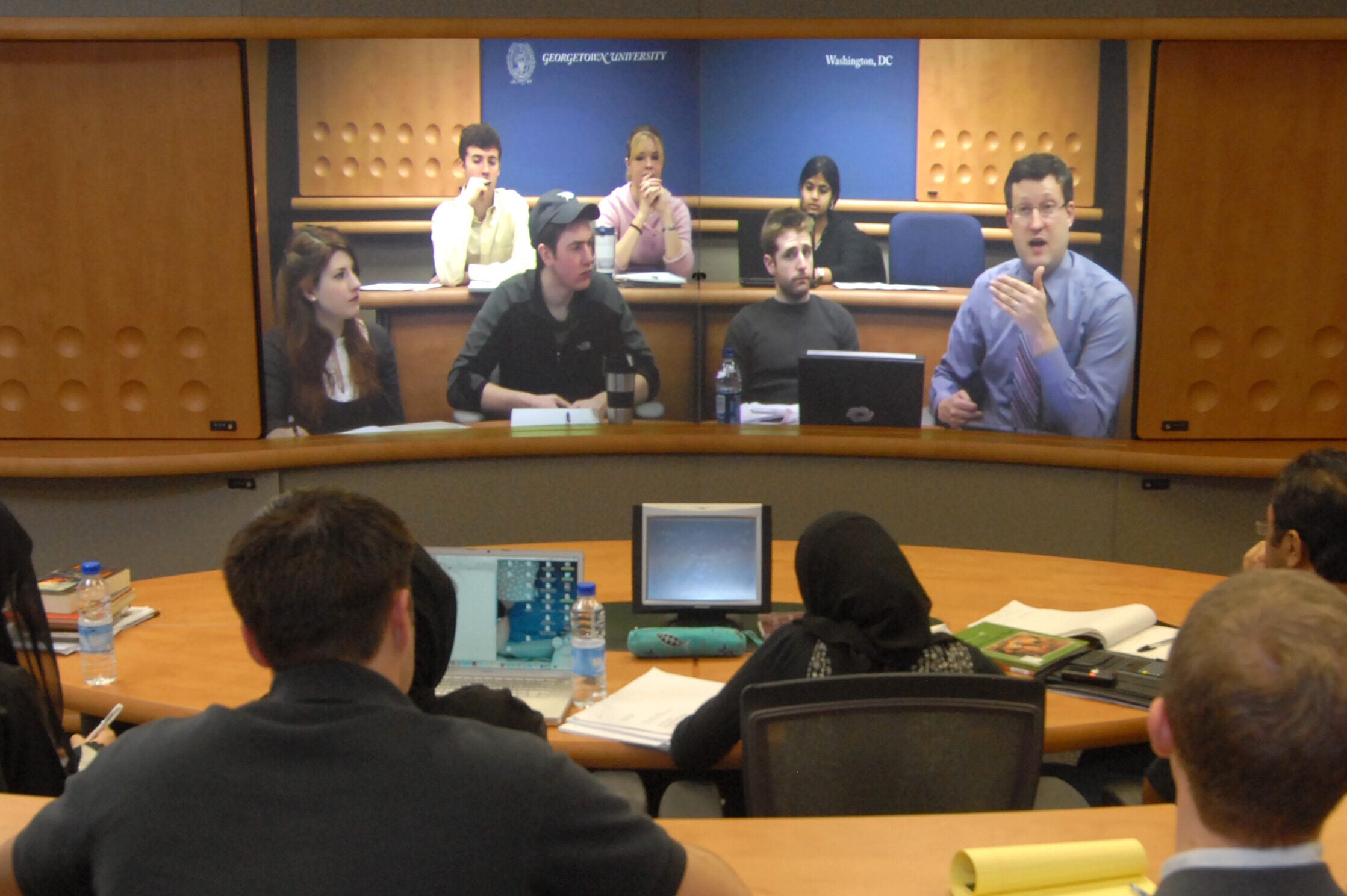Core Curriculum – Years 1 & 2
About the Core Curriculum
To understand difficult global problems, BSFS students need knowledge from many academic disciplines. A complex issue like war, for example, requires students to understand politics, economics, history, religion, and culture, among other areas of study. The Core Curriculum (“the Core”) offers students a deep foundation on which their major and elective courses are built while instilling values of citizenship and service.
Hear about the core curriculum from students who have experienced it
Core Courses
In their first two years of study, students take the SFS Core consisting of Proseminar, Government, History, Economics, Science and Map of the Modern World, in addition to the university Core requirements of Theology, Philosophy, Writing, Humanities, Arts, Literature and Culture (HALC), and Quantitative Reasoning and Pathways to Social Justice. Together these courses give students the knowledge they need to understand and solve problems while maintaining the broad nature of a liberal arts education.

Some courses are co-taught by faculty from both the Qatar and Washington, DC campuses through a live interface global classroom
SFS Core Curriculum
The Core Curriculum must be completed in the first two years of studies. Certain courses are sequenced and must be taken at specific times.
Every student is required to take two courses in Writing and HALC
- First course – WRIT 1145 (Fall Year 1) or WRIT 1155 (Fall Year 1)
- Second course – WRIT 1165 (Spring Year 1) or other designated HALC* course
- Introductory history course, HIST 1099
- One HIST course numbered between 1103-1999
- Any HIST course numbered between 1103-4900
- one of the 3 courses must be designated as “early” history
- THEO 1000 Problem of God (or THEO 1100 Introduction to Biblical Literature, if offered)
- One other course with THEO prefix or attribute
- PHIL 1900 Political and Social Thought
- One other course with PHIL prefix or attribute
- GOVT 1400 Comparative Political Systems (Spring Year 1)
- GOVT 1600 International Relations (Fall Year 2)
- ECON 1001 Principles of Microeconomics (Fall Year 1)
- ECON 1002 Principles of Macroeconomics (Spring Year 1)
Choose one of the following as the third Economics course (IECO majors are required to take ECON 2543, ECON 2544, and MATH 1350 prior to starting the IECO major, so potential IECO majors are advised to take ECON 2543 or ECON 2544, and not ECON 2542, as the third economics course):
- ECON 2543 International Trade (Fall Year 2)
- ECON 2544 International Finance (Spring Year 2)
- ECON 2542 International Economics (Fall Year 2)
- Arabic and French course registration, and total number of courses, depends on placement.
Learn More About Modern Foreign Language through Oral Proficiency
- UNXD 1200 Race, Power and Justice at Georgetown (1-credit)
- Two courses attributed as Pathways to Social Justice (overlay requirement*) (6 credits)
*Overlay: the Two Pathways to Social Justice courses may also fulfill other requirements (core, major, minor, and/or certificate)
Learn More about Pathways to Social Justice
- INAF 1000 (Spring Year 1)
- INAF 1010 (Fall Year 1)
- One INAF 1810 or a course with attribute “Science for All”
- Any course with the attribute Quantitative Reasoning and Data Literacy (QRDL overlay requirement). For more information regarding QRDL, visit the Office of the Provost
*Overlay: the QRDL course may also fulfill another requirement (major, minor, or certificate)
- *Generally speaking, HALC courses cannot double count between the core and any other academic program.
- **Failure to complete the core government sequence as described above will adversely affect a student’s ability to declare the IPOL major and/or register for upper-level courses in government and politics.
- ***The downloadable core curriculum sheet serves as a guideline — some courses may alternate between fall and spring
Foreign Language Proficiency
In order to earn the BSFS degree, every student in the School of Foreign Service must demonstrate that he or she has the minimum skills necessary to complete academic or professional work in a modern language other than English.
GU-Q offers language instruction in Arabic and French. Students who do not have proficiency in a language other than English must enroll in Arabic or French language courses in the first semester at GU-Q. A language placement examination is required to determine appropriate course registration. Students must complete up to seven courses within the language sequence and pass a language proficiency examination administered by Georgetown University faculty. A “pass” on the proficiency exam is comparable to achieving, depending on the language, an Intermediate high to Advanced mid on the American Council for the Teaching of Foreign Languages Proficiency Guidelines (ACTFL) rating, or a B1/low B2 in the Common European Framework of Reference. Students who pass the proficiency exam are able to sustain a discussion dealing with current events, demonstrating familiarity with relevant historical, cultural, political, and economic information.
Students who have knowledge of a language other than Arabic or French may take a proficiency exam administered by the American Council for the Teaching of Foreign Languages (ACTFL). If they are deemed proficient, based on the ACTFL Proficiency Guidelines, that language satisfies the language requirement for SFS. Registration for the ACTFL is administered by the dean’s office. Students should complete their ACTFL proficiency examination within the first semester of study at GU-Q.
GU-Q offers an Arabic Minor, which is an excellent opportunity to take advantage of GU-Q’s location in Qatar and pursue Arabic language study and proficiency, as well as a minor in French.